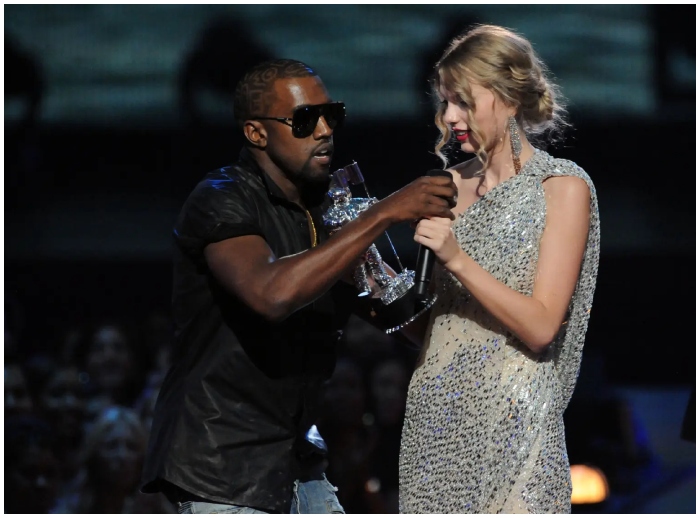The music world witnessed yet another chapter in the long-standing saga between Kanye West and Taylor Swift with the release of West’s track “Carnival,” featured on his collaborative album with Ty Dolla $ign, “Vultures 1.” This latest installment not only rekindles their well-documented feud but also raises questions about the dynamics of celebrity conflicts, the use of controversy as a marketing tool, and the impact of such disputes on the artists’ legacies.
A Decade-Long Feud
The animosity between Kanye West and Taylor Swift dates back to the 2009 MTV Video Music Awards, where West infamously interrupted Swift’s acceptance speech. This moment marked the beginning of a tumultuous relationship that has seen its fair share of ups and downs, public spats, and reconciliations gone awry. Over the years, their feud has evolved, with each incident adding layers to their complex dynamic and highlighting the intersections between personal grievances and public personas.
“Carnival”: A Provocative Lyricism
In “Carnival,” West doesn’t hold back, delivering lines that directly reference Swift alongside mentions of other controversial figures. This bold move by West is not out of character; his career has been punctuated by moments of unapologetic candor and provocative statements. However, this latest mention of Swift seems to be more than just a lyrical choice—it’s a deliberate invocation of their shared history, designed to elicit a reaction and perhaps, to some extent, to reclaim a narrative that has often escaped his control.
The Role of Controversy in Music
Controversy has long been a staple in the music industry, serving as a catalyst for public interest and discussion. In the case of West and Swift, their ongoing feud has consistently captured the attention of both their fanbases and the broader public. This not only fuels media coverage but also engages audiences in a narrative that extends beyond the music itself. West’s decision to name-drop Swift in “Carnival” can be seen as a strategic move to leverage this controversy, ensuring that his latest project garners attention in an ever-competitive musical landscape.

Social Media and Public Perception
The reaction to “Carnival” on social media platforms highlights the polarized nature of public opinion regarding West and Swift’s feud. While some users argue that West’s mention of Swift is a desperate attempt to stay relevant, others view it as an artist simply exercising his creative freedom. This division reflects broader societal debates about the boundaries of artistic expression, the role of celebrities in shaping cultural conversations, and the ways in which social media amplifies and distorts public perceptions.
The Impact on Legacy
The enduring nature of the feud between West and Swift raises questions about its impact on their respective legacies. For Swift, her ability to navigate the controversies while maintaining her status as a pop icon speaks to her resilience and savvy understanding of media dynamics. For West, his willingness to court controversy and push boundaries is a testament to his role as a provocateur in the industry. However, the repeated references to past grievances also risk overshadowing their musical achievements, reducing their rich careers to a series of public disputes.
Looking Beyond “Carnival”
As “Vultures 1” makes its rounds and “Carnival” stirs up conversations, it’s worth considering what lies beyond this latest episode in the West-Swift saga. While the track has succeeded in reigniting discussions about their feud, it also serves as a reminder of the complex interplay between personal animosity and professional rivalry. The music industry, with its penchant for spectacle and drama, often blurs these lines, turning individual conflicts into public spectacles.
Conclusion
The saga of Kanye West and Taylor Swift is a microcosm of the larger dynamics at play in the world of celebrity culture. Their feud, while personal, is also a public performance played out on the global stage of social media and popular music. “Carnival” is not just a song; it’s the latest act in a drama that has spanned more than a decade, offering insights into the power of controversy, the impact of celebrity feuds on public perception, and the ways in which artists navigate the treacherous waters of fame and public scrutiny. As both artists continue to evolve and their careers progress, the legacy of their feud will undoubtedly remain a fascinating chapter in the annals of pop culture history.